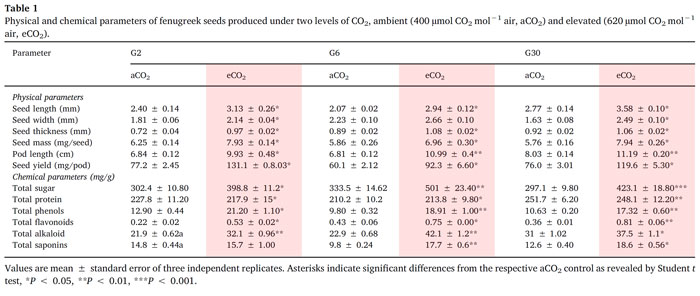| Tweet | Follow @co2science |
Paper Reviewed
Hozzein, W.N., Saleh, A.M., Habeeb, T.H., Wadaan, M.A.M. and AbdElgawad, H. 2020. CO2 treatment improves the hypocholesterolemic and antioxidant properties of fenugreek seeds. Food Chemistry 308: 125661.
In providing the reason for their study, Hozzein et al. (2020) say "currently, research in the area of preventive medicine is focused on supporting the functional value of plant based foods by improving the endogenous levels of their health-promoting primary and secondary compounds." And in this regard, they add "the up-regulation of photosynthesis is an effective strategy to enhance the synthesis of the bioactive phytochemicals by improving the availability of the required precursors of metabolic energy."
But how can photosynthesis be upregulated to improve such health-promoting substances in plants?
One solution is to raise the air's CO2 content, which action increases the substrate supply for photosynthesis, which in turn enhances the assimilation of carbon and the production of primary and secondary metabolites in plants that are of value to human health. And this is exactly the solution employed by Hozzein et al. in a recent study investigating the impacts of elevated CO2 on health-related compounds of three fenugreek (Trigonella foenum-graecum) cultivars (G2, G6 and G30). As described by the authors, fenugreek is a leguminous plant whose seeds and leaves, "either intact or in powdered form, and their extracts are widely utilized for both nutritional and medicinal purposes." In particular, they note fenugreek is utilized as an antioxidant, anti-inflammatory, antimicrobial, antifungal, anticancer and antidiabetic medicine, as well as in the treatment of hypercholesterolemia.
The work was conducted in controlled-environment chambers with plants grown under one of two CO2 treatment levels: ambient (400 ppm) or elevated (620 ppm). At the full maturation stage (118 days after sowing) the scientists collected the seeds to analyze their physical and chemical properties. The main results are presented in the Table below.
As indicated, the 220 ppm increase in atmospheric CO2 stimulated all measured physical parameters in each cultivar, including seed length, seed width, seed thickness, seed mass, pod length and seed yield. In particular, elevated CO2 enhanced seed yield by 70%, 53% and 57% in the G2, G6 and G30 cultivars, respectively, relative to ambient conditions. Additionally, Hozzein et al. report that "the total contents of sugars, proteins, phenols, flavonoids, alkaloids and saponins were significantly increased in almost all cultivars in response to elevated CO2 treatment." Further, the authors note (1) "CO2 enrichment enhances the hypocholesterolaemic potential of fenugreek seeds," (2) "seeds of elevated CO2-treated plants possess higher antioxidant capacity," (3) "CO2 enrichment improves the antibacterial activities of fenugreek seeds," and (4) "the contents of vitamin C, vitamin E, vitamin K (Phylloquinone) and two forms of vitamin A were significantly improved in the seeds of the three cultivars in response to elevated CO2 treatment."
In discussing their findings, the researchers write "the up-regulation of photosynthesis not only enhances plant growth, but also provides the energy and precursors required for the synthesis of various secondary metabolites," which explains why "seeds of the elevated CO2-treated plants showed significantly higher values of the measured physical parameters and improved contents of total sugars, proteins, phenolics, flavonoids, saponins and alkaloids."
Such positive findings noted above demonstrate that not only can rising atmospheric CO2 improve the production of agricultural, but its medicinal value as well.





